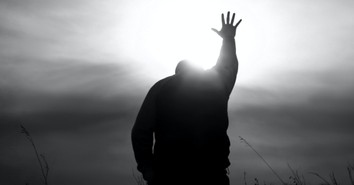Why Does God Allow Bad Things To Happen To People?

On the morning of Sept. 11, people the world over saw the face of evil in the kamikaze airplane crashes that claimed the lives of thousands and left millions mourning for the surviving families and loved ones. In spite of all the attempts of philosophers and psychologists to rationalize away sin and evil, it's difficult to deny its effects at a time like this.
We live in a fallen world very far from the paradise God created for us. In this world, bad things happen to us that we simply can't explain apart from evil. Given our natural tendency toward self-reliance, the bad things we encounter can drive us "to depend on God," "to learn something" and "to come closer to Him," say Katy, 7, Kelly, 6, and Kelsey, 7. "God wants us to ask him for help," says Katherine, 7.
Furthermore, we might discover that God regularly turns the world and intentions of evil people upside down. After being sold into slavery by his envious brothers (Genesis 37) and falsely accused (Genesis 39), Joseph was thrown into an Egyptian jail and forgotten.
Joseph could have held a perpetual pity party and focused only on all the bad things that happened to him. Instead, he discovered what Kendall, 11, learned: "I've found when you lose something or someone special, the Lord blesses you with something even better."
That something, in Joseph's case, was beyond his imagination. Joseph used his God-given ability to interpret Pharaoh's dream, which was a prophecy about a coming famine. He recommended a plan for storing grain that saved many lives. In one day, Joseph went from jailbird to prime minister of Egypt.
When his cruel brothers showed up to buy food because of the famine, he could have said: "Payback time! Starve for all I care!" Instead, Joseph forgave them and treated them with kindness and generosity.
Speaking to his brothers about their selling him into slavery, Joseph said, "You meant evil against me, but God meant it for good" (Genesis 50:20). Looking back, Joseph saw God's ingenious career path that promoted him to a position in which he saved many lives from the seven-year famine.
Just as Joseph accepted the bad things God allowed in his life, Jesus faced what looked like the greatest disaster of all time -- crucifixion on a cross. In our day, the cross has been turned into a beautiful symbol, but in Jesus' day, it was equivalent to the electric chair -- the worst punishment for the worst criminals.
To die on a cross between two criminals appeared to be total defeat and humiliation. Yet, God took this shameful death and turned it into the greatest victory in all history: victory over death. In this irony of ironies, resurrection life now flows from what had appeared to be the most tragic death ever recorded.
"We deserved to be punished for our sins," says Launa, 8, "but remember that God suffered worse."
God has a mysterious way of taking what people intend for evil and working it out so that his purpose is accomplished in a way that the depraved perpetrators could never have imagined. The ultimate terrorist, Satan himself, never imagined that Jesus' death on the cross would pay for the sins of the world. Every time someone accepts God's gift of eternal life, he gnashes his teeth.
"All things work together for good," says Carly, 11, quoting part of Romans 8:28. Carly, don't forget the qualifying part of this promise, "to those who love God, to those who are called according to His purpose."
Some might call such an optimistic view of bad things unrealistic, wacky or just plain nuts, but not Katharyn, 8, and Rachel, 9: "He wants us to believe in him so that we will have faith."
Write and draw for a new book about moms: www.kidstalkaboutgod.com. Bible quotations from New King James Version.
COPYRIGHT 2001 CAREY KINSOLVING
Originally published October 15, 2001.




